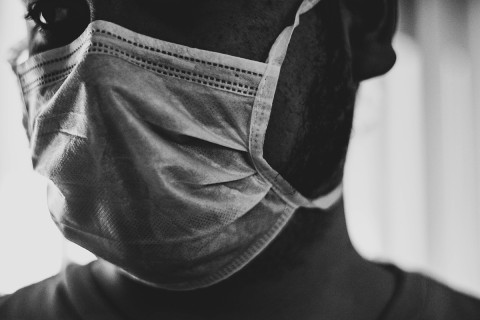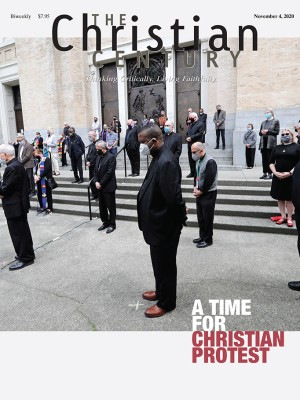Our masks have unmasked us
There is a parable here of half-hidden faces, wounds, and a lack of love.

There is a scene midway through the gorgeous, heartbreaking film Honeyland in which Hatidze Muratova, one of Europe’s last wild beekeepers, carefully removes bandages from her elderly, infirm mother’s face. For the first time, the viewer sees the oozing, bloody wound, the sightless eye. In their dimly lit dwelling on the remote, craggy slopes of northern Macedonia, Hatidze cares for her suffering mother with love and tenderness just as she does the wild bees, even as the two women bicker and provoke each other.
There is a parable here, I think, for what has unfolded so far during the coronavirus pandemic: a story of half-hidden faces, of wounds festering beneath our individual and collective lives, of darkness and a failure of vision, of bickering, provocation, and worse, of love and its lack.
Read our latest issue or browse back issues.
We could not have guessed that wearing a mask, a practice considered so routine and essential in operating rooms and ICUs as to go uncommented upon until this March, would become, as we now say, “politicized.” We may indulge in the puns and pop culture memes about face coverings (my favorite is from The Princess Bride: “I think everyone will be wearing them in the future”), but the jokes mask the pain of this fractious time and the truth that many damaged relationships may never heal.
Because it’s not about the piece of cloth. It’s about what has been unmasked in the wearing—and not wearing—of masks. Whole ways of seeing the world have collided with other whole ways of seeing the world. It seems especially quaint now to imagine that a reasoned argument will convince a recalcitrant interlocutor (who may be someone we love) of our way of seeing the world. But it has always been the case that we rarely talk someone out of a firmly held conviction, since the conviction is lodged deep in a narrative and moral frame we likely do not share, may find abhorrent, or cannot even recognize. And so we talk and text and post and pontificate past each other. We are exhausted and incredulous that we can make no inroads to understanding, no progress in persuading another of what seems intuitively, ridiculously obvious to us. We have been here before.
Still, it seems different this time. The wounds exposed during this pandemic feel deeper, more painful, and longer lasting. Physical isolation has meant chronic loneliness for many, which is only compounded by feeling alone in one’s way of seeing the world and thus the pandemic. Bickering turns easily into a war of scathing, scalding words that scorch the common ground that both casual and more meaningful friendships rest on. It is so dark we cannot see—really see—each other.
But we do see each other’s masked and unmasked faces. Where we might have once granted nuance and complexity to a neighbor’s social views or religious commitments, we now size up immediately which team they’re on. It’s like we’ve all got political signs on our lawns now, whether we want them there or not. And depending where we live, venturing out in a mask can make us feel oddly, ironically vulnerable. We wear it to protect others and ourselves from a potentially deadly virus, but the reactions we sometimes get—the snort, the stare, the perfected eye roll—are unnerving.
Our masks have unmasked us. Those of us who wear them diligently, as irritating and uncomfortable as they are, telegraph our trust in their medical efficacy and our conviction that we are responsible to and for one another. But the unmasked have also been unmasked. They tell a different story, one with plot points around individual freedom or global conspiracies or both. I am not persuaded by their story, nor are they moved by mine. We do not see the world the same way. Rational discourse gets us nowhere, and our emotions run high and wear us out.
Yet in this fraught, painful time, what we need, I suggest, is more intensity of feeling, not less. We need to practice what the late congressman John Lewis called public love and what womanist theology describes as the politicization of tenderness: a regard for the humanity of another that wants their well-being so much that we are willing—we are called—to confront their fear, fragility, and paranoia, so that we might love to death all that robs them of love and that harms those they think they cannot love. This love is the antithesis of sentimentality (feeling for feeling’s sake). It is instead the risky, emotionally exhausting work of encounter, where failure is common and victories are small. It is a love that exposes false loves but does so from a place of humility, since genuine encounter with another always reveals my own weaknesses and blind spots.
I cannot talk my neighbor into wearing a mask. I can only hope to embody a humanizing love that helps us see together the wounds in need of healing. When we take the bandages off, I want us both to see systems in need of undoing, policies in need of unmasking. I want us, with others, to practice the politics of tenderness by which no one is disposable—not the COVID-19 patient in a nursing home, and not the Black man in the street crying “I can’t breathe.” And I want us to see how love draws a straight line between the two.
For this to happen, “the heart has got to open in a fundamental way,” as Leonard Cohen wrote. My neighbor’s heart and mine.
A version of this article appears in the print edition under the title “Our masks have unmasked us.”







